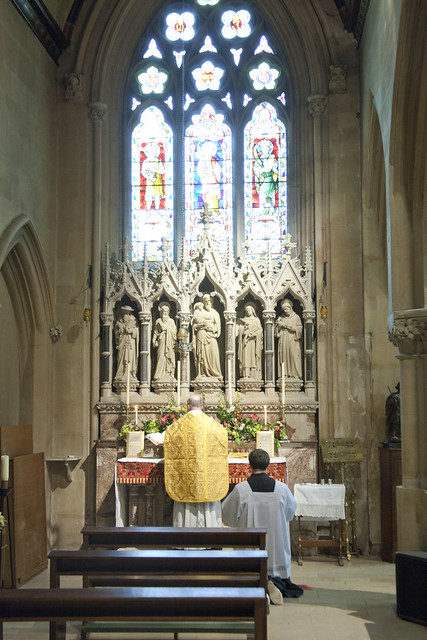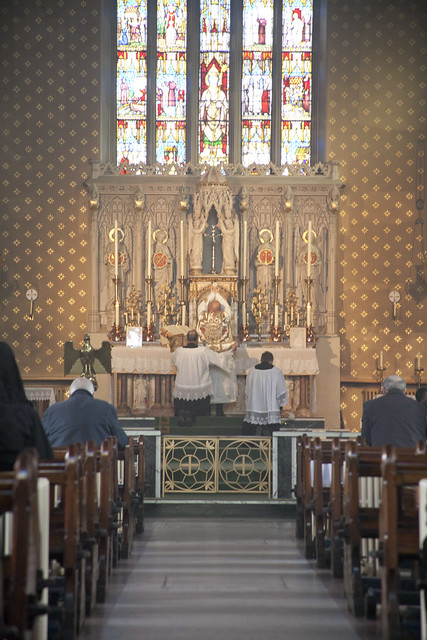 |
| Low Mass (a private Mass) said at the Belmont Priest Training Conference |
Positio 18, The Missa Lecta.
Some time ago a version of this was published in the Latin Mass Magazine in the United States.
This is the usual practice in England, the United States, and many other places, and it surprises those from certain other countries, notably France, where it is normal for the congregation to join in the responses made by the server. This latter practice is called the 'Dialogue Mass' (Missa recitata), and it was (re)introduced in the early 20th century.
The point of the paper is to show that the Missa lecta has its own rationale: you don't have to say the responses to participate in Mass. There is an obvious parallel with other issues thrown up by the liturgical debate in the course of the 20th century: the position papers have had to argue that you don't have to hear the Canon of the Mass in order to participate; you don't have to be able to see clearly what's happening on the Altar (ie have Mass 'facing the people') in order to participate; you don't have to understand all the words (ie have Mass in the vernacular) in order to participate. Catholics attended Mass with great spiritual fruit for many centuries without the aids thought so essential by 20th century liturgists.
On the historical question, it is important to bear in mind that Low Mass itself did not exist until the 9th century, so the question of saying the responses at Low Mass did not arise. The choir sings certain responses at sung Mass, and the people can join in with these, but the responses sung by the choir are not the same as those said by the servers, which are more numerous, and in a few cases lengthy. It seems that these were said by congregations at Low Mass in Southern Europe in the 16th century (and presumably before then), but there is no evidence that congregations in Northern Europe, who would have found them much more of a linguistic challenge, ever got their tongues around them.
The paper should not be seen as an attack on the Dialogue Mass: in some countries this is what happens at the Extraordinary Form at Low Mass, and it has obvious advantages. It means the Faithful become very familiar with parts of the Latin of the Mass, and engage in the action in the sanctuary in a very close way. The paper merely says that those who do not make the responses shouldn't be despised and looked down on for that reason. In any case, in whatever country you are in, in the Traditional Mass after the Offertory the responses stop, and the priest says the Canon in complete silence, broken only by the sound of the little bell signalling the consecration, and the priest's prayer of humility: nobis quoque peccatoribus. This is the real stumbling block for the theory of participation which seems to be implied by the Novus Ordo, and it simultaneously seems to be the feature of the Traditional Mass most immediately attractive to many newcomers.
Peter Kwasniewski has published a lovely meditation on the silent Low Mass here.
 |
| Low Mass with a congregation, at St Chad's, Manchester |
Thank you for posting that. I have only been to one properly traditional Mass and it was silent. I wasn't sure how that fitted in with much of what I had read so far. This now explains it.
ReplyDeleteActually I will have been to more than one traditional Mass but am too young to remember the earlier ones.
The Contemplative Mass
ReplyDeleteI always find the non-dialogue Low Mass deeply spiritual and contemplative, most Traditional Latin Masses in England and Wales are like this.